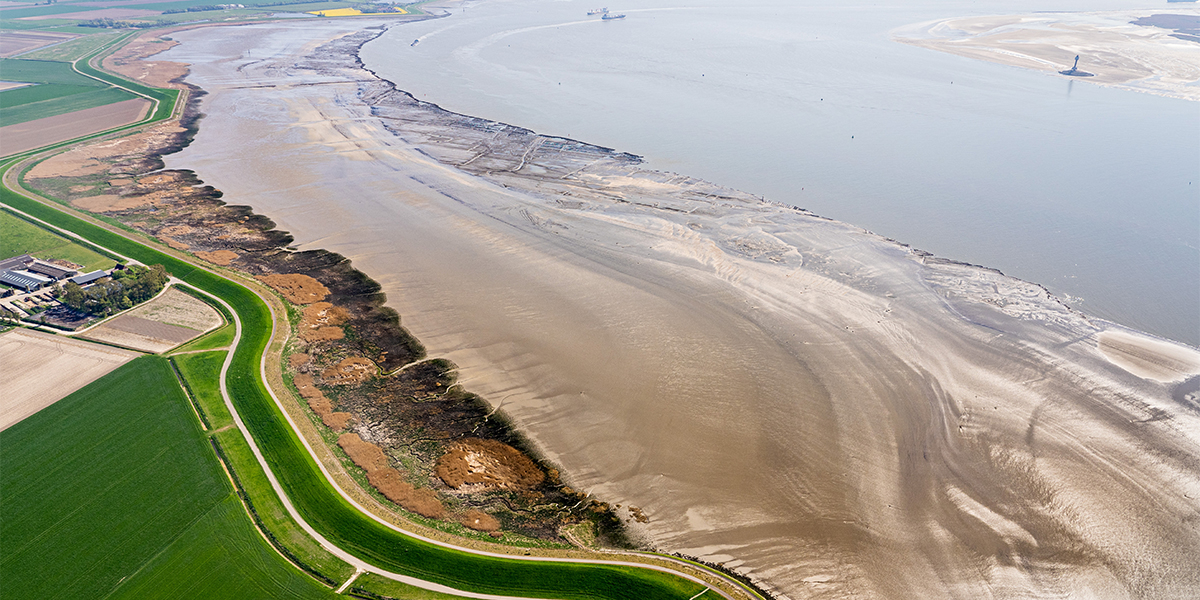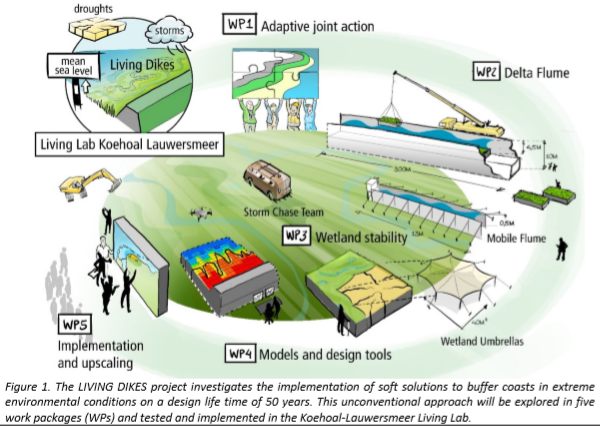Living Dikes project receives NWA-ORC funding

The NIOZ contribution to the Living Dikes project will primarily focus on obtaining insights in the resilience of wetlands under climate change. For this NIOZ will quantify how the wetland edge dynamics relate to abiotic and biotic characteristics. The effect of drowning by sea level rise and droughts on wetland erodibility will be studied by manipulative experiments in the field. As part of the Storm Chase Team (lead by a Univ. Twente-post‐doc), NIOZ will study the wetland edge dynamics at several areas in NW Europe, with measuring locations event-wise selected for maximum storm exposure. Moreover, NIOZ will contribute to real-scale flume studies in the unique Delta flume, located at Deltares. Finally, NIOZ will develop and test novel biodiversity‐promoting wave‐breaker designs to protect wetland edges. Nature‐conservation organisations (Natuurmonumenten, It Fryske Gea, Waddenfonds and WWF) are closely involved in execution of the field studies.
NIOZ scientist Tjeerd Bouma is extremely excited about having this project granted: “The projects enables carrying-out unique large-scale experiments, using both filed facilities like e.g., the MoBi-WAVE field flume recently developed at NIOZ, as well as the Delta-flume at Deltares, which is the largest wave-flume in the world. Being able to do experiments with such facilities is extremely rare, and highly needed to enable testing the performance of Nature-Based Flood protection under the extreme storm conditions that only happen once every few-thousand years. And without such tests, implementation is impossible. But this is not the only reason why this project is so exciting: in the project we also collaborates with social scientist and many many stakeholders, which is equally important if you aim for implementation of Nature-Based Flood protection. I hope that this project will be the game changer towards implantation”

Official secretary on behalf of the consortium: Dr Bas Borsje – University of Twente of the Department of Civil Engineering, group of Water Engineering and Management
The Living Dikes Consortium: University of Twente, Royal Netherlands Institute for Sea Research NIOZ, Utrecht University, University of Groningen, TU Delft, Van Hall Larenstein University of Applied Sciences, Wetterskip Fryslân, Young Wadden Academy, Deltares, Rijkswaterstaat Noord Nederland, SkyPilotUAS, World Wide Fund for Nature, Royal HaskoningDHV, HKV, Arcadis, Witteveen+Bos, Waddenfonds, Veiligheidsregio Groningen, Water Board Noorderzijlvest, Water Board Hunze en Aa’s, Hoogwaterbeschermingsprogramma HWBP, STOWA Foundation for Applied Water Research, Boskalis, Van Oord, Wadden Academy, Deltacommissaris, Buitenspelen, It Fryske Gea, Rijke Waddenzee, Natuurmonumenten, Delft Flood Polder, Province of Groningen, Province of Friesland, Municipality Noardeast Fryslân, Pachtersvereniging, Waddenvereniging, Neeltje Jans, Task Force Delta Technology, Massachusetts Institute of Technology, University of Antwerp, University of Florence, University College Cork, Nanjing Hydraulic Research Institute, University of Strathclyde, University of Hannover, VNU University of Science, University of Reading, University of New Orleans, Trinity College Dublin, Technical University of Denmark
